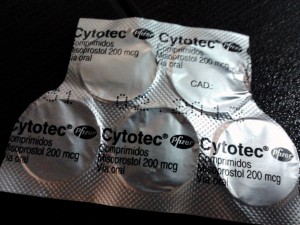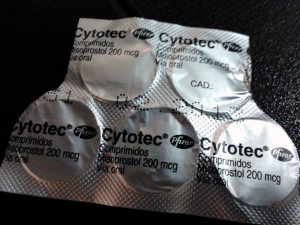By ED SITJAR

JEANNE sat with her 2-month-old baby at a fastfood restaurant in a mall in Caloocan City, looking like a regular customer. In reality, she was there to make a sale, and waiting for a client to pick up the merchandise.
The client walked in, approached her and forked over P1,250. Jeanne then handed over a small plastic bag containing the merchandise the client ordered from her through a website.
As the customer was checking the contents, Jeanne nervously begged that the bag be opened discreetly. Moments later, the customer walked away, satisfied the goods were in order: Five tablets of Pfizer’s Cytotec purchased for a younger sister who had gotten herself pregnant.
Cytotec (generic name: Misoprostol) is a drug to prevent gastric ulcers, treat miscarriages or induce labor. But the Bureau of Food and Drugs restricted its sale in 1994 amid reports women were using it to do away with unwanted pregnancies. It is now delivered clandestinely, with the transaction taking place mostly online.
Cytotec is often used together with Methergine, originally developed to treat after-pregnancy bleeding and improve the uterine tone, which is now prohibited from being sold without a prescription.
Following BFAD’s order, law enforcers launched operations against illegal peddlers of Cytotec and Methergine, mostly in places like Quiapo, a famous haven of herbs and drugs touted to induce abortion.
But as the transaction at the Caloocan mall shows, the unregulated sale of Cytotec and Methergine through the Internet is just as rampant. The reason: Access to the drugs is easy, and the risk of getting caught is low as the government is hardly aware of or doing much about the online sellers.
The sale of Cytotec and Methergine through the Internet has been taking place below the radar of the BFAD, which is clueless that these online transactions are taking place.
Lawyer Emilio L. Polig Jr., chief of BFAD’s Legal, Information and Compliance Division, said it was the first time his agency has heard that Cytotec and Methergine were being sold online and asked for help in gathering evidence.
“Pwede mo bang maibigay sa amin (ang ebisyensya) para maibestigahan namin (Can you give us the evidence so we can investigate this)?” he said.
Cytotec’s attraction to Filipinos as an abortifacient comes as little surprise. The National Demographic and Health Survey found 16 percent of pregnancies to be unwanted. Abortion is a crime in the Philippines, yet every year, as a result of these unwanted pregnancies, half a million Filipino women induce abortions.
BFAD’s 1994 order limited the sale and dispensing of Cytotec to tertiary hospital pharmacies and big drugstore chains.
In August 2002, however, BFAD further tightened restrictions because the drug was no longer registered with it. This means the government could not assure the drug’s safety, efficacy and quality.
The bureau’s 2002 advisory reminded the public that the manufacture, importation, exportation, sale, offering for sale, distribution or transfer of any unregistered drug and device with it is a violation of Republic Act 3720, the Food, Drug, Devices and Cosmetics Act. It also urged the public to report to the BFAD and police information that would lead to the arrest of persons dealing with Cytotec.
Polig confirmed that Cytotec remains unregistered with BFAD.
Mercury Drug, the country’s leading drug store, said it does not carry or sell Cytotec. Pfizer’s local office said it does not manufacture or supply Cytotec in the country.
But online sellers have ignored the ban, offering Cytotec and other abortifacient medicines through websites such as six popular sites that were tracked for this report. (VERA Files is withholding the domain names to discourage readers from visiting the sites.)
The medicines are being sold in a package for P2,900 to P3,400, or singly—P250 for Cytotec and P100 for Methergine.
Stacey sells the drugs as package for P2,900 a kit through one site. The package includes Cytotec, Methergine and Mifepristone (Mifeprex) that is used to treat spasms. (VERA Files removed the exact quantity of the tablets.)
She requires a customer to buy the whole package, saying Cytotec alone will not terminate the pregnancy. She said Mifepristone should follow the use of Cytotec because it discharges the fetus after this has been detached from the womb. Methergine, on the other hand, cleans up the uterus to prevent infection and helps stop the bleeding, she said.
Stacey even offers instructions on how to take the medicines in the proper way to achieve the intended result.
“May kasama pang instruction galing kay doktora na OB-Gyne. At katext mo din ako para alalayan ka sa pag-inom ng gamut (I even have instructions from an OB-Gyne doctor, and you can text me so I can guide you through the medication),” she said.
Stacey markets her products as “genuine drugs” as opposed to those sold in Quiapo. She said she gets the drugs from Dubai and the Netherlands.
Because most online sellers know the consequences of selling prohibited drugs, they send the medicines through LBC or Air21, and advise their buyers to pay them through Globe G-Cash, LBC or a Banco de Oro account.
But they also do agree to meet persistent clients in person, as Jeanne did at the Caloocan mall.
Lyn, who bought the medicines over the Internet, said she was assisted by her supplier while taking the drugs.
One online site even runs a forum thread called “Post-Abortion Experiences” to allow users of Cytotec and Methergine to share their experiences.
Zeni started the thread when she kept bleeding for two weeks after she took after she took Cytotec and Mifepristone. The bleeding was unlike a menstrual flow. The blood she was discharging, she said, was like “jelly ace,” a gel-like candy.
Advice and comments came pouring after she posted her fears on Feb. 7, 2010.
Lizbeth told Zeni that she, too, had experienced bleeding after downing Cytotec and Mifepriston. She was only convinced the combination was effective when she saw the fetus come out with blood clots.
She then advised Zeni to undergo an ultrasound to make sure no tissues were left inside her womb.
“Malamang sa’yo meron pang mga tissues na naiwan sa loob. Better pa ultrasound ka para malaman mo kasi possible na mabulok yan sa loob and very dangerous po yun (There might have tissues left in your womb. You better have an ultrasound to avoid infection because it’s dangerous),” she wrote.
These conversations form the bulk of the discussion. But there was one post inviting readers to visit well-known hospitals for abortion services, or contact the secretary of a doctor for a consultation appointment through a mobile phone number.
Because the services at the supposed hospitals are advertised, this gives buyers the impression that abortion through the use of Cytotec is not only legal but also safe. It is not totally safe.
A report published in September by Reuters Health online cited studies showing that Cytotec, usually obtained on the blackmarket for about $2 a dose, can indeed achieve complete abortion between 70 and 94 percent of the time.
Researcher Rachel K. Jones of the New York City-based Guttmacher Institute, a nonprofit organization focused on sexual and reproductive health, the relative case, told Reuters the effectiveness and low cost of the drug make it appealing to a woman seeking to end her pregnancy.
But Jones warned that the improper use of Cytotec can result in an increased risk of complications, including severe bleeding and incomplete abortion. If the pregnancy persists, birth defects are possible, she said.
Many women suffer the consequences of unsafe abortions. In the Philippines, about 79,000 are admitted to hospitals for complications and 800 die from them.
The BFAD, meanwhile, consistently warns consumers against using fake or unregistered medicines since these do not contain pharmaceutical ingredients or may indicate wrong dosages. Worse, some unregistered drugs may even contain toxic ingredients, it says.
In the case of Cytotec and other abortion-causing drugs sold through the Web, Polig said existing laws, such as RA 3720 (Food, Drugs and Cosmetic), RA 8203 (Laws on Counterfeit Drugs) and RA 4729 (Law on Contraceptive Drugs and Devices), cover online sellers.
“It does not matter how you sell it. It might be through online or whatever medium. Regardless, it is prohibited for any person to export, sell, offer for sale a product that is not registered from a person who is not licensed,” he said.
Lawyer JJ Disini of the University of the Philippines’ Law Internet and Society Program said all laws on prohibited drugs indeed apply to online sales of pharmaceuticals, but he pointed out problems in enforcing the laws.
“It’s just more difficult for law enforcement agencies to identify the perpetrators. If they wanted to, the cops can track down the cellphone numbers. Maybe it’s not a priority with them,” he explained.
Polig said BFAD is also stumped on how to regulate online sellers of prohibited drugs like Cytotec.
“It’s really hard because we are not sure with their locations. We are not sure if they live here in the country or not. Unlike with retail drugstores or establishments, we can easily track them,” he said.
Polig said the importation of unregistered drugs also falls outside BFAD’s ambit.
“It’s not our concern anymore; it’s the Customs Bureau’s responsibility,” he said.
(Ed Sitjar, a masteral student at the University of the Philippines College of Mass Communication, wrote a longer version of this report for his Investigative Journalism class under VERA Files trustee Yvonne T. Chua.)
